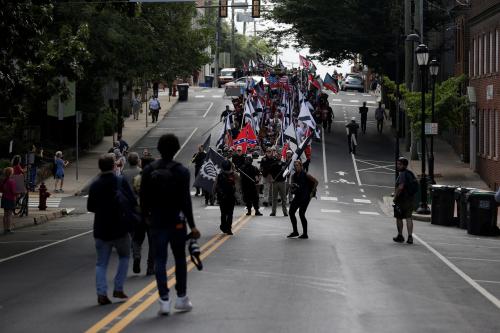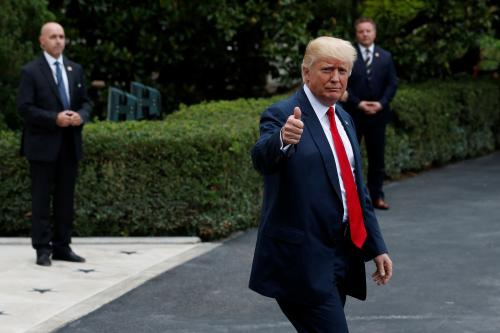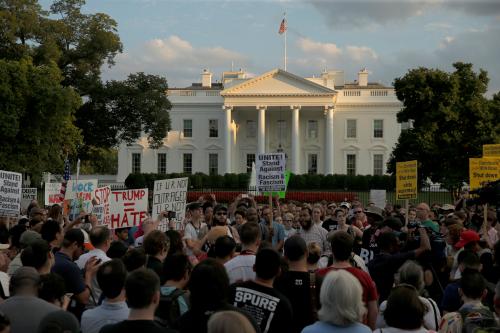The protests born from the murder of Minneapolis resident George Floyd further exposed the tremendous racial bias and inequality in this country, and the cell phone video footage of his killing showed the country the latest example of the state-based terror exacted on Black America. My Black colleagues have written powerfully about that pain and suffering, their own experiences, and reforms to improve conditions across the United States. The protests in the streets of cities across all 50 states and the District of Columbia exposed other issues: the hypocrisy and failed leadership of President Donald Trump.
The president and his surrogates have stoked racial tensions in the wake of nationwide protests, by linking in his rhetoric the throngs of peaceful protestors with the few rioters and looters. In lumping everyone into one group, he shows the true colors of his racial divisiveness, tweeting that they are “thugs” and “scum” and even tweeting support for an advisor’s letter in which he labeled peaceful protestors “terrorists.”
This is different language than Mr. Trump reserved for the attendees of the 2017 Unite the Right rally in Charlottesville. The anti-Semitic, white nationalist event included chants of “Jews will not replace us.” Heather Heyer, a counter-protestor, was murdered that day by a white supremacist who drove his car through a crowd. In response, Mr. Trump explained that “there are good people on both sides.”
The idea that Mr. Trump respects peaceful protest but is opposed to violence is laughable. When he is not having his stormtroopers or rally supporters attack those peaceably assembling, he is criticizing athletes who kneel, silently and peacefully, during the national anthem. He blasted players and the NFL in a series of 18 tweets in September and October 2017 as he raged over peaceful protest.
The president’s response to the current protests has further thrust his racial hypocrisy to the fore. In words that would ring hollow, the president stated, “we cannot allow the righteous cries and peaceful protesters to be drowned out by an angry mob.” Moments later he oversaw his own mob of Secret Service and other federal law enforcement officials teargas peaceful protestors in the park in front of the White House. He gassed a group exercising its First Amendment rights so he could pose awkwardly with a found Bible in front of a church of which he is only intimately familiar with its exterior.
Once again, Donald Trump does not hate protests. He hates dissent.
He can support protests chanting anti-Semitic rhetoric in Charlottesville and wherever it suits his political base. In April 2020, a group of white men charged the Michigan Statehouse, many armed with weapons including assault rifles, to protest the tyrannical power of the governor—a governor who asked them to wear masks and told them they had to delay their haircuts. In response to an armed protest (during which no one was suffocated by a police officer’s knee or chokehold), Mr. Trump tweeted, “The Governor of Michigan should give a little, and put out the fire. These are very good people, but they are angry. They want their lives back again, and safely! See them, talk to them, make a deal.”
People who disagree with the president are thugs; yet, he laments that White, armed, Michigan mask-and-manicure protestors “want their lives back again.” But what about the lives of George Floyd, Breonna Taylor, Eric Garner and Ahmaud Arbery and thousands of other Black Americans? White, gun-toting protestors screaming about the policies of a female governor (willing to stand up to the president) are “very good people,” as are white nationalists chanting with torches. Black protestors are “thugs” and “scum.”
This separation between a president’s love of law and order when it suits him and disdain for it when it may impact his allies or voters is at the core of his racialized politics. And it spills over to other areas of governing. The president, committed to “draining the swamp,” criticizes the criminal justice system that has convicted his friends and associates—even those who pleaded guilty to their crimes. And in the wake of COVID-19, several of the president’s criminal cronies got early release, while many Blacks and Latinos saw their brothers and sisters and mothers and fathers remain locked up for far less serious crimes.
The very Justice Department who he has deputized to help rough up journalists and racial justice protestors on the streets of DC is the same Justice Department he has called a “disgrace” over the prosecution of his friends. The president has protested Congressional requests for documents and members of his administration to appear at oversight hearings out of fear they may find the very wrongdoing he sought to root out of government.
Finally, the president has ensured that the government’s inspectors general would face criticism and dismissal if they dare investigate, issue a report that shows mismanagement, or criticize the operations of the Trump administration. Former IGs Michael Atkinson (Intelligence Community), Mitch Behm (Transportation), Glenn Fine (Defense), Christi Grimm (Health and Human Services), and Steve Linick (State) are among those fired for doing the job of draining the swamp. The president who wraps himself in the cloak of “law and order” expects everyone else to be held accountable except him, his friends, and his voters.
A hypocrite in the White House with a total lack of empathy cannot understand why Black Americans have taken to the streets to voice their anger, and a president who celebrates violence against his opponents cannot understand violence in the name of survival. Peaceful protests are ignored or criticized by the government; disruptive protests are seen as threats requiring military intervention. As my colleague Camille Busette notes, there is a deep and lasting value in listening to the stories and the experiences that Black America has faced. It is essential to understand both the resolution they seek as well as the cause: systemic racism that has touched every one of them.
Donald Trump’s failures of leadership make certain that anger will continue, problems will go unsolved by this White House, and more Black men and women will die at the hands of rogue police and vigilante citizens who see race and not racism as America’s problem.
It is reminiscent of the words of Frederick Douglass, who if alive today, would need to do little to revise his 1866 essay to reflect the current era. In responding to Andrew Johnson’s veto of the 1866 Civil Rights Act, Douglass wrote of the need for Congressional intervention:
“A treacherous President stood in the way…Congress knows now that it must go on without his aid, and even against his machinations…The members go to Washington fresh from the inspiring presence of the people. In every considerable public meeting, and in almost every conceivable way, whether at court-house, school-house, or cross-roads, in doors and out, the subject has been discussed, and the people have emphatically pronounced in favor of a radical policy. Listening to the doctrines of expediency and compromise with pity, impatience, and disgust, they have everywhere broken into demonstrations of the wildest enthusiasm when a brave word has been spoken in favor of equal rights and impartial suffrage. Radicalism, so far from being odious, is now the popular passport to power.”
Black Americans still seek that passport to power. Not because they are angry, not because they are thugs, but because they are citizens.
The Brookings Institution is committed to quality, independence, and impact.
We are supported by a diverse array of funders. In line with our values and policies, each Brookings publication represents the sole views of its author(s).








Commentary
Donald Trump does not hate protests—he hates dissent
June 5, 2020